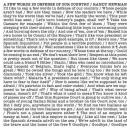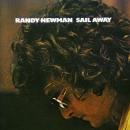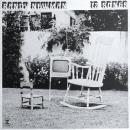[Verse 1]
In America you get food to eat
Won't have to run through the jungle and scuff up your feet
You'll just sing about Jesus and drink wine all day
It's great to be an American
[Verse 2]
Ain't no lion or tiger, ain't no mamba snake
Just the sweet watermelon (1) and the buckwheat cake
Everybody is as happy as a man can be
Climb aboard, little wog (2), sail away with me
[Chorus]
Sail away, sail away
We will cross the mighty ocean into Charleston Bay(3)
Sail away, sail away
We will cross the mighty ocean into Charleston Bay
[Verse 3]
In America every man is free
To take care of his home and his family
You'll be as happy as a monkey in a monkey tree (4)
You're all gonna be an American
[Chorus]
Sail away, sail away
We will cross the mighty ocean into Charleston Bay
Sail away, sail away
We will cross the mighty ocean into Charleston Bay
In America you get food to eat
Won't have to run through the jungle and scuff up your feet
You'll just sing about Jesus and drink wine all day
It's great to be an American
[Verse 2]
Ain't no lion or tiger, ain't no mamba snake
Just the sweet watermelon (1) and the buckwheat cake
Everybody is as happy as a man can be
Climb aboard, little wog (2), sail away with me
[Chorus]
Sail away, sail away
We will cross the mighty ocean into Charleston Bay(3)
Sail away, sail away
We will cross the mighty ocean into Charleston Bay
[Verse 3]
In America every man is free
To take care of his home and his family
You'll be as happy as a monkey in a monkey tree (4)
You're all gonna be an American
[Chorus]
Sail away, sail away
We will cross the mighty ocean into Charleston Bay
Sail away, sail away
We will cross the mighty ocean into Charleston Bay
(1) A reference to the stereotype that black people enjoy watermelon. This stereotype is rooted in the Reconstruction era, as many freed slaves began growing watermelon as a sign of independence. Racist Southerners began the stereotype to mock the now free African Americans.
(2) Wog (wŏg) aka: Golliwog
(noun) Chiefly British offensive slang
used as a disparaging term for a person of color, especially a person from Africa, or western and southern Asia.
(3) It is estimated that around 40% of slaves brought to North America arrived through Charleston, SC.
(4) This line is ironic because actual living Monkeys do not live in Monkey trees as it is common belief that they do. Monkey trees are too prickly and sharp for actual Monkeys, the trees get their names because the branches look like Monkey tails.
The irony places into the premise that the song is written through the eyes of the slave trader trying to convince the African natives that America is really as great as he is telling them.
“Monkey” being a common racial slur in society.
(2) Wog (wŏg) aka: Golliwog
(noun) Chiefly British offensive slang
used as a disparaging term for a person of color, especially a person from Africa, or western and southern Asia.
(3) It is estimated that around 40% of slaves brought to North America arrived through Charleston, SC.
(4) This line is ironic because actual living Monkeys do not live in Monkey trees as it is common belief that they do. Monkey trees are too prickly and sharp for actual Monkeys, the trees get their names because the branches look like Monkey tails.
The irony places into the premise that the song is written through the eyes of the slave trader trying to convince the African natives that America is really as great as he is telling them.
“Monkey” being a common racial slur in society.
envoyé par Pluck - 24/7/2022 - 22:43
×
![]()






“Sail Away” by Randy Newman appears on his album, Sail Away (1972).
Newman presents “the pitch” of an American slave trader to Africans in Bonny, off the west coast of Nigeria.
The slaver sings a song about the wonderful life to be had in Charleston.
Selling a lie about what life will be was used, but the more common practice was going inland to kidnap and shackle those you found.